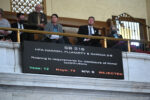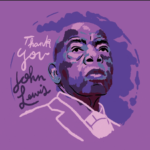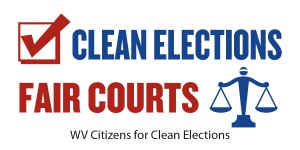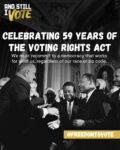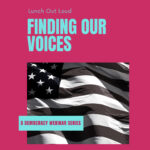In July, Natalie Thompson and I represented WV Citizens for Clean Elections at the second annual Fair Courts State Summit in Washington, DC. The summit, hosted by our national partner Justice at Stake and sponsored by the Brennan Center for Justice, Wellstone Action, and the Piper Fund (longtime funders of our clean elections work) brought together advocates from around the country working to insulate courts from political pressure, boost public support for judicial independence, protect the courts’ ability to deliver justice and guard people’s rights, and ensure diversity among those who become judges.
At the summit, West Virginia was highlighted as a bright spot due to the judicial reforms we’ve passed in response to Don Blankenship’s election meddling and the resulting scandals that led to the Caperton v. Massey U.S. Supreme Court decision. West Virginia is one of only two states with a judicial public financing program in place (the other being New Mexico). I had the pleasure of serving on a panel with Melissa Price Kromm from North Carolina, where, ironically, the Republican controlled legislature repealed their trailblazing program the same year West Virginia lawmakers voted to make our program permanent.
Highlights from the conference included:
- Matt Menendez of the Brennan Center for Justice, Florida Supreme Court Justice Peggy Quince and other panelists discussed the impact of Williams-Yulee v. the Florida Bar, in which the U.S. Supreme Court recently upheld a Florida rule that prohibits judges and judicial candidates from directly soliciting campaign contributions. As the New York Times reported, the decision effectively upheld measures in 30 states (including West Virginia) that forbid judicial candidates from making person appeals for money. This case is an important victory for fair courts, allowing states to protect the integrity of their courts by shielding justices from the perception that they may be biased in favor of particular contributor. However, it is also a narrow victory dealing with only one judicial canon. Other codes of judicial conduct are under attack, making it critical for advocates to continue pushing for reforms such as robust disclosure of political spending, public financing, and more effective recusal rules that counter threats to fair, impartial and independent courts.
- Reporters shared stories about who is trying to influence the courts, how, and why. Featured panelists included Viveca Novak, an award winning investigative journalist and editorial and communications director at the Center for Responsive Politics, who has reported extensively on dark money groups and their involvement in congressional, presidential and judicial politics. Pema Levy of Mother Jones magazine was also featured. Levy authored a recent expose detailing how two groups targeted in the Scott Walker campaign finance scandal spent over $10 million to elect a conservative majority to the Wisconsin Supreme Court, which ultimately killed the investigation into possible illegal coordination between the Governor and the groups.
- A look at current research documenting the way that politicized judicial selection/elections are undermining our justice system and the ability of criminal defendants to get a fair trial. Presenters included Emory University Professor Joanna Shepherd, whose report, “Skewed Justice”, found evidence that attack ads accusing court candidates of being “soft on crime” make judges less likely to rule for criminal defendants in appellate cases. This was one of the principle findings in the study by Shepherd and her colleague Michael Kang. Additionally, the study found that justices in states whose bans on corporate and union spending on elections were struck down by Citizens United were less likely to vote in favor of criminal defendants than they were before the decision.
- A panel on linking environmental issues and fair courts focused how polluters are spending large sums of money in judicial elections in states where they face litigation. The discussion kicked off with a screening of a new mini-documentary from Legal Progress highlighting the real human impact of special interest money that is infiltrating judicial elections. The film features one North Carolina family’s story of how coal ash pollution poisoned their community. The film also calls attention to a troubling correlation between North Carolina Supreme Court rulings and the success rates of firms that gave big donations to judicial candidates following the repeal of the state’s public financing system. This was detailed in a Center for American Progress report from November 2014, raising concerns about corporate influence in judicial races. The report profiled corporate polluters such as Duke Energy, which currently has billions of dollars at stake in North Carolina courts over its responsibility to keep toxic coal ash out of the state’s drinking water.
- Keynote address by Sue Bell Cobb, former Chief Justice of the Alabama Supreme Court, whose featured article in the March/April edition of Politico Magazine, “I Was Alabama’s Top Judge. I’m Ashamed by What I Had to Do to Get There”, provided a first-hand account of how money and politics are undermining the integrity of our courts.
We are looking forward to participating in next year’s Summit — hopefully with more success stories to report from the Mountain State. Next year will be the first Supreme Court election since Justice Allen Loughry used public financing in 2012 to win one of two contested seats on the court. We hope another publicly financed colleague will join him on the bench and we were please to hear the recent announcement that Justice Brent Benjamin plans to use public funds in his 2016 relection bid.
Those who are interested can check out the great panels and keynote address from the 2015 Summit at http://bit.ly/FCSsummit.


